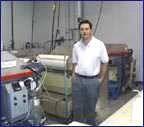world gathers for metal finishing
Q&As since 1989
-----
Reaction acid+metal
Q. I want to know about particle exchange when magnesium reacts with hydrochloric acid. Also why does the reaction speed up when the molarity is increased?
Lauza h [last name deleted for privacy by Editor]- Hertfordshire, UK
2001
Q. Can I have some info on reactions between hydrochloric acid and magnesium? I need to know how dilution (moles) affects the reaction.
Gabriel O [last name deleted for privacy by Editor]- London, UK
2001
A. Reactions take place when molecules collide. When you increase the molarity, the rate of collisions increase, because there are more acid molecules to collide with the magnesium. The increased collisions result in a quicker reaction.

Tim Neveau
Rochester Hills, Michigan
2001
A. Molarity is the concentration of a substance. in this case hydrochloric acid. the higher this is the lower that is.
Bob Litchfield- Newcastle, Great Britain
2005
April 2018
A. Hi. Tim is right, another way to say the same thing might be that if you have a higher molarity, i.e., more acid and less water, then you'll have more reactive acid contacting the magnesium, and less inert water contacting it, so the reaction will be faster. Good luck.
Regards,

Ted Mooney, P.E.
Striving to live Aloha
finishing.com - Pine Beach, New Jersey
Magnesium + hydrochloric acid reaction
2002
Magnesium Ribbon
on
Amazon
(affil links)
Q. I am doing an experiment in which I react magnesium ribbon to hydrochloric acid. Can you tell me the process and how this works.
Latoya G [last name deleted for privacy by Editor]- Spring Valley, New York, United States
A. Magnesium ribbon is just another form of magnesium metal. This reacts with hydrochloric acid (and virtually all other acids) to form the acid salt of magnesium and hydrogen:
Mg + 2HCl = MgCl2 + H2↑
Hydrogen is a gas and will be seen as bubbles. However, it is also very explosive, so do not have any flames around when you do it, unless you know exactly what you are doing! Magnesium chloride is soluble, so the magnesium ribbon will slowly disappear into solution.

Trevor Crichton
R&D practical scientist
Chesham, Bucks, UK
2002
Multiple threads were merged: please forgive repetition, chronology errors, or disrespect towards other postings [they weren't on the same page] :-)
Q. I am in year 9 at the moment and are trying to do my coursework for chemistry when I came across one point where I need some information on the method used between the reaction of magnesium and hydrochloric acid which would help me with my prediction if that makes any sense.
Lauren D [last name deleted for privacy by Editor]- Stevenage, Hertfordshire, England
2002
2002
"Naked Eggs and Flying Potatoes: Unforgettable Experiments that Make Science Fun"
by Steve Spangler
on
AbeBooks
or
eBay
or
Amazon
(affil links)
"Earth Science for Every Kid: 101 Easy Experiments That Really Work"
by Janice VanCleave
on
AbeBooks
or
eBay
or
Amazon
(affil links)
A. Sorry, Lauren, your wording doesn't quite make much sense to me, so I'm a little concerned that you might be looking for an answer without clearly understanding the question :-(
But magnesium is a very active metal, and hydrochloric acid is a strongly ionizing and non-oxidizing acid. So maybe your predictive method could be that this reaction should be expected to follow the normal path of reactions between two such materials?
Luck and Regards,

Ted Mooney, P.E.
Striving to live Aloha
finishing.com - Pine Beach, New Jersey
Q. Why does Hydrochloric Acid dissolve magnesium?
Peter W [last name deleted for privacy by Editor]- Oak Park, Illinois, USA
2003
A. Hi Peter. As mentioned, hydrochloric acid is a strongly ionizing non-oxidizing acid, and magnesium is a very active metal.
Please see our short article on Faraday's Law -- it starts with an introduction to atoms & electrons which will explain why the magnesium 'wants' to combine with the chlorine to form a balanced molecule of magnesium chloride salt. The HCl 'lets' the magnesium surrender two electrons to the hydrogen, allowing the hydrogen to escape as hydrogen gas, and the magnesium to combine with the chlorine.
Regards,

Ted Mooney, P.E.
Striving to live Aloha
finishing.com - Pine Beach, New Jersey
February 2014
Multiple threads were merged: please forgive repetition, chronology errors, or disrespect towards other postings [they weren't on the same page] :-)
Q. Hi,
I was wondering if you could help me, I've got to do my GCSE chemistry coursework on the reaction between hydrochloric acid and magnesium ribbon, but I can't find any Scientific Knowledge to put in the coursework, would you please be able to give me some?
Thank you very much,
Laura [last name deleted for privacy by Editor]- Lincoln
2003
A. Hi, yeh the magnesium ribbon reacts with the hydrochloric acid in a redox reaction, where the magnesium is reduced and hydrogen is oxidised as it gains electrons from the magnesium. It becomes MgCl which is soluble in solution so effervescence is seen as it dissolves and hydrogen is released. Background knowledge you should just write about different factors affecting rate like surface area, concentration or temperature depending on which one you are looking at and explain why, for example with temperature talk about the kinetic energy and collision theory.
Hope I've helped xx
Katie S [last name deleted for privacy by Editor]- UK
2003
A. I think Kate is wrong:
oxidation is the Loss of electrons so the magnesium is oxidised and the hydrogen reduced as the hydrogen gains electrons lost from the magnesium.
- UK
January 19, 2010
![]() Hi, Anjola. You are right, the magnesium is oxidized and the hydrogen is reduced.
Hi, Anjola. You are right, the magnesium is oxidized and the hydrogen is reduced.
Additional good discussions on this topic can be found on threads 7266 and 11194. Good luck!
Regards,

Ted Mooney, P.E.
Striving to live Aloha
finishing.com - Pine Beach, New Jersey
Q. Can somebody tell me will it be cold or hot when we touch the outside of the beaker where the experiment is conducted? Thanks.
Ed B [last name deleted for privacy by Editor]- Seattle, Washington
April 18, 2013
A. Hi Ed. According to Wikipedia: "An experiment is an orderly procedure carried out with the goal of verifying, falsifying, or establishing the validity of a hypothesis . . . In the scientific method, an experiment is an empirical method that arbitrates between competing models or hypotheses". This means you have to touch it to find out. I hope it helps.
One of the greatest physicists and teachers, Richard Feynman, passed away in 1988 but left behind a legacy including the following .
Regards,

Ted Mooney, P.E.
Striving to live Aloha
finishing.com - Pine Beach, New Jersey
Q. Can you tell me what happens in the magnesium and Hydrochloric acid in terms of atoms and possible energy transfers?
Melbin Manu- Brisbane,Australia
May 21, 2018
A. Hi Melbin. Trevor Crichton explained what happens with a formula:
Mg + 2HCl = MgCl2 + H2↑
If you want it in words, it's:
"One molecule of magnesium and 2 molecules of hydrochloric acid react with each other to produce one molecule of magnesium chloride and two atoms of hydrogen (one molecule of hydrogen gas)".
As previously mentioned, please see our Introduction to Faraday's Law which tells you why this reaction occurs. In terms of energy transfer, the reaction releases energy (a small amount of heat). If you picture how a ball rolls downhill by itself to a lower energy state, that's another way of looking at what is driving the reaction. Good luck.
Regards,

Ted Mooney, P.E. RET
Striving to live Aloha
finishing.com - Pine Beach, New Jersey
May 2018
Q, A, or Comment on THIS thread -or- Start a NEW Thread
